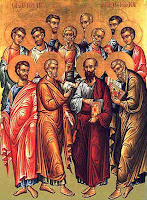 Apostolic Succession #1
Apostolic Succession #1In the debate between competing truth claims, the crux of the matter fell upon the authority of the church. No one on any side questioned that the truth was what Jesus taught and lived. They disagreed over the content of Jesus' teaching and life. Apostolic succession becomes important here.
Paul wrote to churches in order to address particular situations that those churches were facing. The Apologists wrote specifically to combat misunderstanding of Christianity by the state and to make it sound credible by aligning it with the philosophy of the day.
The heresies of the second century required a response. Here we get the great teachers of the church. Their task was to give systematic expression to the Christian faith in response to the system of doctrine developed by the heretics. They tried to give a complete exposition of the Christian faith.
While the church faced persecution in the first half of the second century, in the last years the church had enjoyed relative peace. This was true because the Roman Empire was starting to fall apart. Between civil war and invasions from Germanic peoples (whom the Romans called "Barbarians"), the Roman government had its hands full. They did not have time to worry about Christians.
In the third century things changed. The emperor Septimus Severus put an end to civil war. This did not mean that the problems of the empire were finished. The barbarians still threatened and the empire was hardly unified. Septimus Severus believed that the way to unity and strengthen the empire was through religious unity. He began to promote syncretism throughout the empire.
His plan was to bring all religious beliefs under the worship of the unconquered Sun-- Sol Invictus. "All gods were to be accepted, as long as one acknowledged the Sun that reigned above." (Gonzalez, The Story of Christianity, I, 83). Of course, it was the Jews and the Christians who refused to go along with such a policy. Septimus Severus decided to wipe out both religions (A.D. 202) All conversions to either religions were outlawed, under penalty of death. Irenaeus and Origin's father may have suffered martyrdom during this persecution.
This persecution was short-lived. It was not generally enforced throughout the empire. Could it be that the people were getting more comfortable with Christianity?
No comments:
Post a Comment